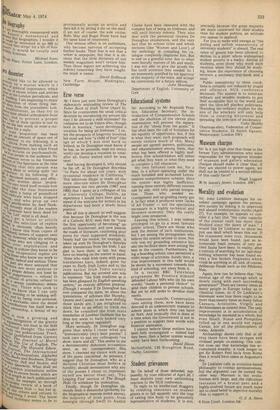411 dissenter
' I h
1, s ould like to be allowed i t to. Illent on a matter which s 've of political importance, which cut of recent letters and articles iri,ne in he London periodicals, and ,:landling. I am beginning to enjoy i.;'es,Peration of those firing last4 en ts from the journalistic Lonle stablishment, as they try to arve their abstird orthodoxies from 01:11t, and to prevent a proper te ,.„' °tie of their tactics is not to the last word, or even a smile, sRace for a reply. .e , word 'proportion' has been I get an amount of space out of .d.'4,0Portion' to my following, it is nrit shrink from making such an kan–eshts Comparison, but when Freud hi lectures on psychoanalysis, kel four i ulii „ People n the audience. No v.,,r.'tneone wrote to the Viennese rsnl'ent of The Spectator at the time that this person was ,--,ing ideas in writing quite out sitetiortion' to his following. If a c Is d' Ply, iscUssed seriously and effeci . Who worries about 'propor urnai e very word itself reveals how .pend–s like the N rn New Statesman ttiti uPon a lump of prejudiced siniadicals who have stopped ktlie,"R, and who prop up one lbbin' s Petrification by herd flank. su'',g. Actually most of the readers Irs'llrdeurnals have been dead for fhe '1e 'Left' mind is all dead. . .e blisi.1.11,1 get a letter or article lish eu the selection of rep le iltecie,d, is obviously often heavily lipub,, 1, know this from copies of .-rm_osned) letters of support sent ti" however, while my writings ,Lsitio`se who are clinging to a Nse,,-" over exploitation and se tent in culture they know to be lloy'in"'ese vituperative replies are iire plite those who know my work to tileirable, radical and serious. These are Part are most annoyed these ta bt vett 41Ies are most anxious titil: b, Proper debate, not least y suppression — refusal to thea 8eriou s (unabusive) debate. tth' refusal of articles, refusal to ntes; rest. Those who seek to i,ltesi i; tile know that I can only 'licit)? seeming to be seeking se ft this ,and by beirig over-personal. Lilly , 's inevitable, since the denial noh;;>ntributions has itself been a e. censorship, a denial of my Ll'h Niaeb, is now a growing and Ay ' 4 'e recognition of the gravity efltITUrnents, not least in the field cllise,,-.`-'Y t ' 4 'e recognition of the gravity efltITUrnents, not least in the field cllise,,-.`-'Y t 1r stel;,..,ti°tIal thought. The reader ibileg.„let (Phe publications Tract,ublished from Garnett '1,!ciiini. The Journal of Moral mkt -"III: The Use of English, The cilP i dvorld, The Harvard EducaZilcerurnal. The International Lnkdmul,,Psychoanalysis, Alphabet i!Ch,..-"' 0 ooks and Bookmen, Energy
,. ,.
Nt,,-"racter, self and Society, and ist,ties Quarterly. What shall we ref„' London journalistic milieu ted"SeS to review books which are S ,,a;,,t length in such publications? for example, let through 1:1 ourable review of a book of Pd Y,ICathleen Nott — but has iglishail the others and refuses to l StanYthing I write. The latest reet technique seems to be to
provisionally accept an article and then kill it by letting it die on the shelf. (I am not of course, the sole victim: Rollo May and Roger Poole have had the same kind of treatment).
One serious effect is on publishers, who become nervous of accepting further books. Their fear is not that a writer is unpopular, but that it is obvious that the little dictators of our weekly magazines won't review him. Thus these bigots are achieving the indirect censorship they have sought: the result is torpor.
David Holbrook New Farm House, Madingley, Cambridge


































 Previous page
Previous page